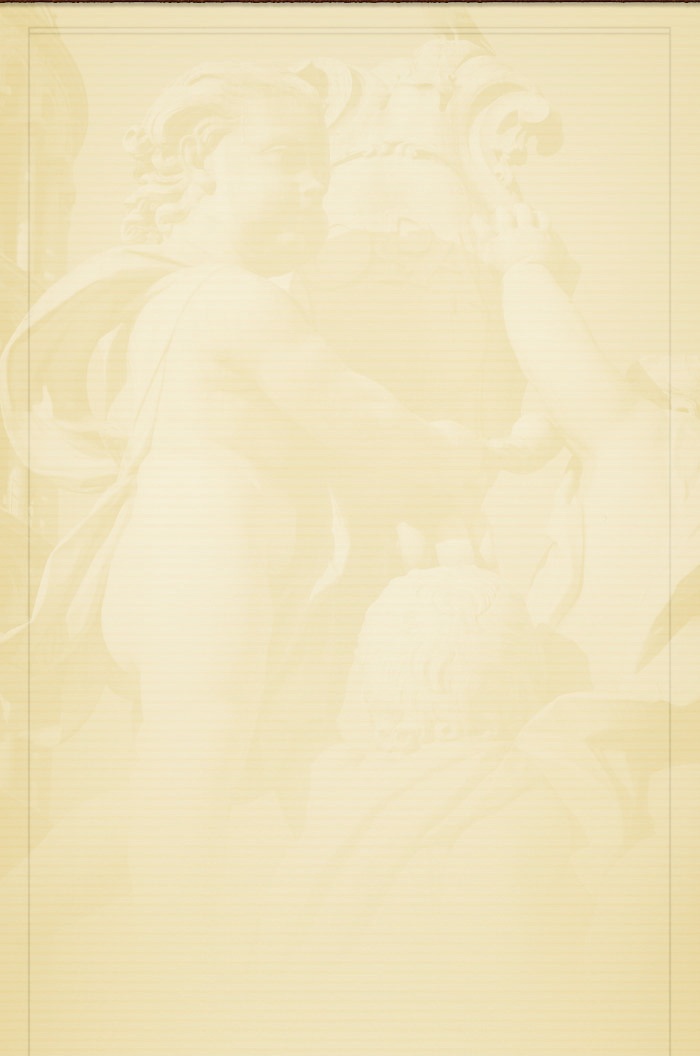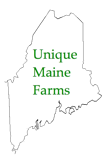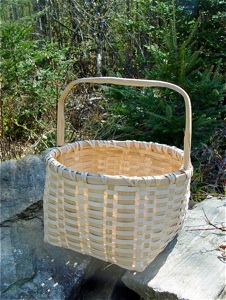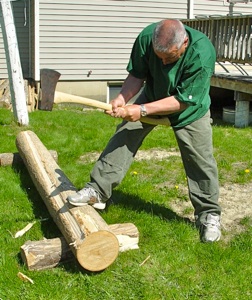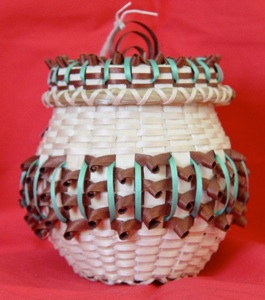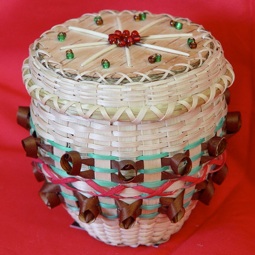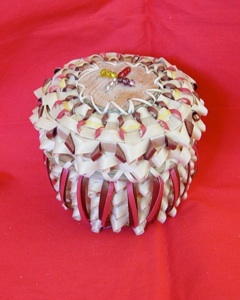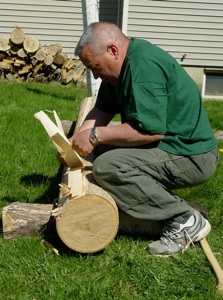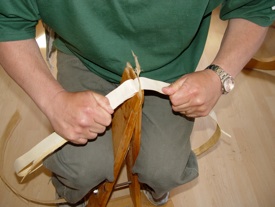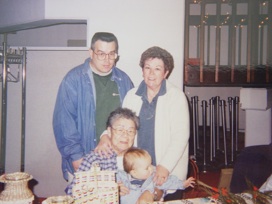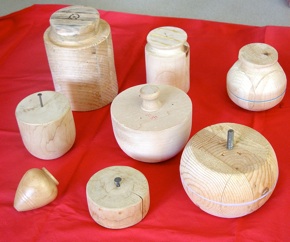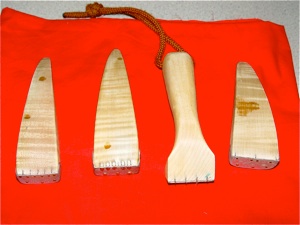Name: Gerald Butch Jacobs
Address: Gerald Butch Jacobs
144 Bonne Terre Road
Waldo, Maine
Phone: 207-342-3295
Etsy Website:
www.etsy.com/people/quoddybaskets
Email: gken@fairpoint.net
Products and Services:
-brown ash harvesting
-traditional brown ash basketry
What Makes Butch Jacobs Passamaquoddy Basketry and Brown Ash Harvesting Unique?
The beautiful basketry of Gerald Butch Jacobs represents the rich and long-lived artistic culture of the Passamaquoddy Nation. His creations involve so much more than just the weaving of brown ash splints into a basket to hold or carry things. History, art, family connections, and a strong tie with nature are all interwoven through Butch’s efforts with his baskets. He is respected for his commitment to carrying on a highly regarded and meaningful Native tradition.
Brown ash is revered in the Wabanaki culture because of its association with the Creation story. There are various versions, but the majority of these stories focus on the relationship between Glooscap and the brown ash tree. It is believed that Glooscap shot arrows at the brown ash tree and the result was that Indians emerged from the bark of the trees.
Woodsplint basketry was very important in the maize horticulture that took place among the Wabanaki people. Food was prepared in baskets and baskets were used to collect and store water, and transport various plants, berries, and herbs. Baskets were also woven for eel and fish traps and backpacks. When visitors to Maine began to flock to various resort areas such as Bar Harbor and Old Orchard Beach in the first half of the twentieth century, the baskets made by the Indians were highly coveted for their ornamental value. To supplement their income many Indians focused on making fancy decorative baskets that incorporated beads, quills, sweetgrass and various designs.
It is interesting to note that basketmaking brought various groups of people together. It has been documented that the Indians and the Shakers formed close ties because of their mutual interest in creating and selling baskets. The concept of Indian families gathering in regard to the making of baskets is still carried out. When the Maine Indian Basket Alliance holds their basket demonstrations and sales events, Indian families look forward to visiting with relatives that they do not always have the opportunity to see.
Early in his life the significance of basketmaking was introduced to Butch. His grandmother, Angela Neptune Barnes, raised seventeen children, but always set aside the time throughout each day to continue the basketmaking tradition that she had learned from her parents and grand-mother. She made fish scale baskets for a sardine factory in Eastport. Her fancy basket work was highly regarded and she was honored as a Master Basketmaker in the Traditional Arts Apprenticeship Program. Butch presently has over thirty of her baskets. She and her sister, Clara Neptune Keezer, were instrumental in introducing Butch to the importance of passing on the basketmaking tradition. He learned by trial and error and from watching others at the Indian Days in Pleasant Point.
Butch has been making baskets since 1999. He uses brown ash from his land or from trees that
people give him. The process to produce a basket from ash is more time-consuming than many people would imagine. After the brown ash log is harvested, according to the Passamaquoddy way, hours of pounding the log must take place to be able to procure the ash splints needed to weave into baskets. Different methods are used by other tribes. Butch explained that the Micmac and the Maliseet split the log and break it up with a hammer. Brown ash is the only tree that one can pound that separates at the annual tree rings.
After the ash splints are split and smoothed, the weaving can begin. Butch commented that the actual weaving of the basket only constitutes a small fraction of the time (10-20%) necessary to produce a basket. Butch gathers sweetgrass from the coastal lands of the Passamaquoddy Reservation to incorporate into many of his baskets. He spends time using a crooked knife to make the wooden handle found on some of his larger baskets. There is also time that needs to be set aside to dye some of the splints certain colors.
Brown ash trees can go by many names. Butch actually refers to the tree as black ash. Some people call it swamp ash or hoop ash. The future of the brown ash tree, and white ash and green ash, are in peril. They are threatened by the Emerald Ash Borer which is an Asian beetle that kills all three types of ash trees found in Maine. The adult Emerald Ash Borers lay their eggs in the bark of ash trees. The larvae hatch and feed on the inner bark which results in the demise of the tree. The beetles have spread to thirteen states and Canada. The transportation of infected firewood is one of the leading causes of spreading the infestation. Unique Maine Farms plans on attending the Brown Ash Symposium at the University of Maine at Orono in June of 2013, and will be adding additional information about the work to prevent the Emerald Ash Borer to this profile.
Butch has been interested in learning more about the Emerald Ash Borer. He attended the Emerald Ash Borer Symposium in Orono in 2010. He traveled to Wisconsin in June to learn about what is being done around the country to prevent further infestation of the beetles at the Inter-tribal Timber Conference.
Butch is also very involved in the Maine Indian Basketmakers’ Alliance. He has served on their Board. He and his family attend the special basket shows with which the Maine Indian Basketmakers’ Alliance is involved including the Native American Festival and Basketmakers Market at the College of the Atlantic in July; the Common Ground Country Fair in September; and the Annual Maine Indian Basketmakers Sale and Demonstration at the Hudson Museum at the University of Maine at Orono in December.
The prices that Butch charges for his handmade
baskets are exceptionally reasonable considering the amount of work involved in making them. It is very clear that keeping the basketmaking tradition alive is much more of a priority than making money for Butch. He has taught classes and made several presentation about making brown ash baskets.
Not just anyone is physically in shape to be able to pound ash trees. It takes an enormous amount of strength and dexterity. Butch has kept busy all of his life. For twenty years he was a boiler operator on an aircraft carrier. For the past twelve years he has worked as a boiler operator at the Versa Paper Mill in Bucksport. Butch and his wife, Kellie, built their house in Waldo, where they are raising their fourteen-year-old son, Ethan, and their eleven-year-old son, Noah. They grow a lot of their own food; homeschool their children; and try to be as self-sufficient as possible.
In the Passamaquoddy language that is listed in the Passamaquoddy/ Maliseet Reference Book there is an extraordinary amount of words relating to baskets. In the pages on “Coarse Baskets” there are forty-six words. Forty-seven Passamaquoddy words are included that relate to “Fancy Baskets.” Butch Jacobs fully understands the important role that basketry has played in the Passamaquoddy culture. It is Butch and Kellie’s intention to pass on the tradition of woodsplint basketry to their sons and other interested individuals. Butch, along with a few other Passamaquoddy Indians, are true keepers of the long-lived basketmaking tradition as they endeavor to pass on the art and culture of handcrafted baskets from one generation to the next.
